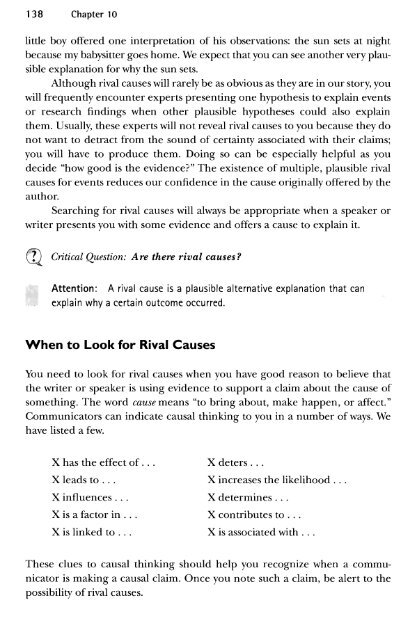Asking the Right Questions, A Guide to Critical Thinking, 8th Ed
Asking the Right Questions, A Guide to Critical Thinking, 8th Ed
Asking the Right Questions, A Guide to Critical Thinking, 8th Ed
You also want an ePaper? Increase the reach of your titles
YUMPU automatically turns print PDFs into web optimized ePapers that Google loves.
138 Chapter 10<br />
litde boy offered one interpretation of his observations: <strong>the</strong> sun sets at night<br />
because my babysitter goes home. We expect that you can see ano<strong>the</strong>r very plausible<br />
explanation for why <strong>the</strong> sun sets.<br />
Although rival causes will rarely be as obvious as <strong>the</strong>y are in our s<strong>to</strong>ry, you<br />
will frequently encounter experts presenting one hypo<strong>the</strong>sis <strong>to</strong> explain events<br />
or research findings when o<strong>the</strong>r plausible hypo<strong>the</strong>ses could also explain<br />
<strong>the</strong>m. Usually, <strong>the</strong>se experts will not reveal rival causes <strong>to</strong> you because <strong>the</strong>y do<br />
not want <strong>to</strong> detract from <strong>the</strong> sound of certainty associated with <strong>the</strong>ir claims;<br />
you will have <strong>to</strong> produce <strong>the</strong>m. Doing so can be especially helpful as you<br />
decide "how good is <strong>the</strong> evidence?" The existence of multiple, plausible rival<br />
causes for events reduces our confidence in <strong>the</strong> cause originally offered by <strong>the</strong><br />
author.<br />
Searching for rival causes will always be appropriate when a speaker or<br />
writer presents you with some evidence and offers a cause <strong>to</strong> explain it.<br />
(J)<br />
<strong>Critical</strong> Question: Are <strong>the</strong>re rival causes?<br />
Attention:<br />
A rival cause is a plausible alternative explanation that can<br />
explain why a certain outcome occurred.<br />
When <strong>to</strong> Look for Rival Causes<br />
You need <strong>to</strong> look for rival causes when you have good reason <strong>to</strong> believe that<br />
<strong>the</strong> writer or speaker is using evidence <strong>to</strong> support a claim about <strong>the</strong> cause of<br />
something. The word cause means "<strong>to</strong> bring about, make happen, or affect."<br />
Communica<strong>to</strong>rs can indicate causal thinking <strong>to</strong> you in a number of ways. We<br />
have listed a few.<br />
X has <strong>the</strong> effect of. . . X deters . . .<br />
X leads <strong>to</strong> . . . X increases <strong>the</strong> likelihood . . .<br />
X influences ... X determines . . .<br />
X is a fac<strong>to</strong>r in . . . X contributes <strong>to</strong> . . .<br />
X is linked <strong>to</strong> . . . X is associated with . . .<br />
These clues <strong>to</strong> causal thinking should help you recognize when a communica<strong>to</strong>r<br />
is making a causal claim. Once you note such a claim, be alert <strong>to</strong> <strong>the</strong><br />
possibility of rival causes.



